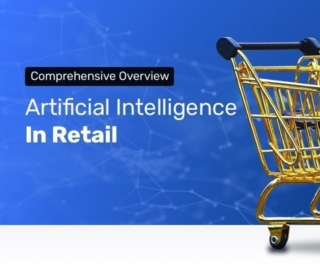
Forrester estimated that online sales in Western Europe will grow at an average of 11.9% annually until 2022. Over this period, 21% of non-grocery retail sales will be online. We see AI as continuing to find its way into the retail industry. This report specifically focuses on innovation in the European retail industry. In it, we cover vendors offering AI software across three applications:
- Inventory Management
- Visual Search
- Sales
What Business Leaders Should Know
Business leaders in the European retail industry seem to have a few options when it comes to AI vendors, and they can move into talks with the vendors in this report more confidently than leaders in other sectors, such as marketing. This is because the companies detailed in this report all employ data science and/or computer science talent with the kinds of credentials we expect from companies claiming to offer machine learning solutions, namely academic backgrounds in computer science, hard sciences, statistical fields, or business experience working with data. Many of the sectors we cover here at Emerj are filled with purported AI vendors that in fact do not employ data scientists at their company, that hire data scientists just to use the AI buzzword, or that hire people in unrelated fields and call them data scientists on LinkedIn to fool potential customers.
It’s heartening to see that the European companies offering AI to retailers aren’t lying about doing AI. Blue Yonder, for example, employs many data scientists who hold PhDs in computer and hard science. In addition, it raised over $70 million before it was acquired by JDA Software for its inventory management software. The company has the highest density of data scientists of those covered in this report. It offers an inventory management solution.
Metail employs five data scientists, four of whom hold PhDs in physics and math. The company lists less than 50 employees on LinkedIn, and so again, the density of data scientists to other employees is relatively high, even if 10% doesn’t sound it. Metail offers a sales solution, which it claims can integrate into its fashion retailer clients’ websites. Once installed, the company claims its clients’ customers can try on clothes through its virtual interface. Aside from Blue Yonder, which was acquired by JDA Software, Metail has raised the most funding at $32.4 million.
Nextail offers another inventory management solution for physical retailers. The company does seem to employ a few data scientists, although those it employs are less credentialed than those of Blue Yonder and Metail. It employs one data scientist with a PhD in Electrical Engineering, which he earned in 2017.
At first we thought Cortexica Vision Systems was the outlier among these companies, listing no data scientists on LinkedIn. Upon further research, it seems that Cortexica calls their computer science talent “Research Scientists.” Nevertheless, the company employs many Research Scientists with PhDs in computer science and hard science, some of whom hold degrees with distinctions or concentrations in machine learning and data science. Cortexica offers a solution for visual search, allowing its clients’ customers to take a picture of a product and upload it to their clients’ websites. Then, the machine learning algorithm behind the software “finds” the pictured product on the clients’ online stores.
Inventory Management
Blue Yonder
Blue Yonder is a German company that offers supply chain, buying, and merchandising software, which the company claims can help supermarket chains predict demand and reduce out-of-stocks and waste using predictive analytics and machine learning.
The company claims that the application’s algorithms take into account internal data such as historical sales, products attributes, store size and location, and promotions, and external data such as weather, holidays, and events to calculate the probability of demand for each product at each store on a daily basis. Once the demand is predicted, the algorithm then recommends order quantities to replenish stocks, per product and per store on a daily basis.
The company claims to improve forecast accuracy by more than 20% and sales by at least 15%.
Below is a short 3-minute video of Natsu’s CIO Jan Meier explaining how Blue Yonder’s demand forecast application works:
Blue Yonder claims to have helped Morrison’s improve its inventory forecasting and restocking process. In 2016, the company was still using manual systems to restock its stores based on the forecasts of in-store staff, a process that was time-consuming, inconsistent, and inaccurate. Morrisons needed a solution that could:
- Improve the assortment of products
- Reduce missed sales
- Simplify the complex demand forecasting process
The company turned to Blue Yonder to improve its demand planning and restocking based on customer behavior across all its outlets. The case study claims that in 12 months, Blue Yonder was able to improve shelf replenishment among 26,000 stock keeping units (SKUs) across 130 categories in all stores. This resulted in up to 30% reduction in shelf gaps and a 1.7% sales increase in the final quarter of 2016. The case study also reported that 2016 was Morrisons’ strongest Christmas sales period in seven years.
In 2017, Morrison’s listed all of its products to the Blue Yonder application, bringing the total number of SKU’s managed to 29,000. This resulted in sales growing by 2.6% during the Christmas period. The case study also reported that Morrison was able to decrease keeping stocks in-store by two to three days.
Blue Yonder lists Orsay, Kaufland, Otto, Natsu, and Selgros as some of its past clients. The company raised $75 million in funding from Warburg Pincus before it was acquired by JDA Software.
Michael Feindt is founder and Chief Science Officer at Blue Yonder. He holds a PhD in Physics from the University of Hamburg. He is also a professor at the Karlsruhe Institute of Technology and a lecturer at the Data Science Academy.
Nextail
Nextail is a Spanish company that offers an automated inventory management tool, which the company claims can help retail fashion businesses balance inventory among its stores to optimize sales using predictive analytics and machine learning.
Nextail claims that the application is accessible throughout the retail organization to digitize most aspects of the physical retail business.
The company explains that the application’s algorithm digitally scans the retailer’s warehouse management system to determine which stores are overstocked and understocked with a specific item. Some factors to determine this might include number of weeks to move specific items, foot traffic at the retail store, pricing, and the demographics surrounding the store location.
The company also explains that the algorithm predicts the sales increase as a result of product transfers, as well as the sale that would be lost if the store did not restock.
The algorithms then digitally reallocates the inventory between stores and computes the cost of the physical trips to transfer the goods. Once the goods are physically delivered to the stores by Nextail’s logistics partners, the transfers are tracked and noted through a mobile app accessed by the store manager.
Below is a short 3-minute video demonstrating how Nextail works:
Nextail does not have case studies in the company website but lists Kiko, Amichi, Melon, Stefanel, Impecavel, Tboe as some of its clients. The company has raised $12 million in funding from Sonae IM, Keen Venture Partners, Nauta Capital, and Realiza Business Partners,
Leo Antoli is CTO at Nextail. He holds an MS in Computer Science from the Universidad Autonoma de Madrid. Previously, he served as Agile Coach and Lead Architect at Agilar and Certified Senior Systems Architect at Pegasystems.
Visual Search
Cortexica
Cortexica is a UK-based company that offers AI-driven image and video applications, which the company claims can help eCommerce businesses offer online shoppers visual search tools of products they want to purchase using computer vision.
Cortexica claims that shoppers, from their device, can upload a photo of the item they are looking for to the application. The algorithms compare the pixels in the uploaded image to images in the eCommerce database. It will then identify images that are similar or a match to the uploaded image. Once it recognizes similar items, the system returns with the recommended results in the form of curated photos of the items.
Cortexica also offers Shoppable Video, a video application that enables shoppers to search for an exact match or similar items using videos in adverts, catwalks, user-generated content, online, and in-store.
To use this application, the shopper must play the video, command the app to display or hide the tags by clicking on a button on the side of the video. The user then clicks on their preferred item on the video. The system will then search the eCommerce database for that item and display curated, visually similar items on the screen. Shoppers may also command the application to find similar items by clicking on the “Find Similar,” button, upon which the algorithms will search the database for the visually similar products and display them on the screen.
Cortexica does not feature case studies on its website but lists John Lewis, Hammerson, Zalando and Cisco as some of its clients. The company has raised $9.2 million in funding from Touchstone Innovations, Imperial Innovations, and Imperial College London.
Anil Bharath is co-founder and Chief Science Officer at Cortexica. He holds a PhD in Electronic Engineering and Biomedical Signal Processing from the Imperial College London. Bharath also serves as a reader in image analysis at the same college. Previously he was Associate Director of the college’s Institute for Security Science and Technology.
Sales
Metail
Metail is a UK-based company that offers MeModel, an application for eCommerce sites and smartphones, which the company claims can help retail shoppers try on clothes virtually using machine learning.
The company claims that the application could increase sales, enhance customer experience and loyalty, reduce product returns, and deepen the retailer’s knowledge about shoppers, among other benefits.
Metail claims that MeModel allows shoppers to input their individual measurements to find the best dress for their unique body size and shape. The company adds that the application now works with 7.2 billion data points collected from customers.
The application first collects body measurements from the customer, as well as their gender, age, style, and brand preference. The company did not explain how the technology works with this data, but we can infer that the application creates a model of the customer using their unique data. The algorithms then take the composite body shape of the user and filters clothes in the retailer’s eCommerce site that match the customer’s shape and size.
The application could also consider the customer’s historical purchases, personal preferences in style and color, average spending amounts, and frequented stores.
The machine learning algorithms will analyze the data to recognize and turn up recommendations that could potentially be a fit for the user in terms of size, style, fit, brand, color, and price.
Metail claims to have helped the House of Holland create a platform in which to showcase its spring and summer 2015 fashion collection at the London Fashion Week (LFW). the application enabled individual customers to create their own ‘MeModel’, try on the clothing from the catwalk, and pre-order the collection in their size.
The case study claims that the application helped the client achieve its key performance indicators over the weekend of LFW:
- Usage of the application rose by up to 76%
- Users spent up to 21 minutes trying on clothes over the LFW weekend, and 14 minutes throughout the campaign period.
- Users tried on 12 looks on average
- 1 in 3 visitors browsed House of Holland’s entire collection
- 401,000 people were exposed to the House of Holland brand
- 8.6 million people were exposed to Metail
- House of Holland was among the top 10 most tweeted designers at LFW
The company also lists ITV and Whole9Yards as among its clients. It has raised $32.4 million in funding from TAL Apparel, Microsoft Accelerator London, John Gleasure, and New World Private Equity.
Jim Downing is the CTO at Metail. He holds an MS in Engineering from the University of Cambridge. Previously, Downing served as Software Officer at the same university where he led several R&D projects, including the Microsoft OREChem project.
Takeaways for Business Leaders in the European Retail Industry
Blue Yonder has raised the most funding, with $75 million in a single round, before it was acquired by JDA Software. It also features strong case studies whose clients testify to the positive results to the bottom line and the in-store processes, following the deployment of the company’s application.
Two of the company offerings covered in this report focus on the back-office management processes, that is, inventory and supply chain, as well as administrative aspects. Businesses looking to adopt AI may see more of these types of applications being offered in the future. Only one company offered an application that directly involved customer-facing and making a product sale.
For online fashion searches and recommendation engines, one of the objectives is to reduce product returns. Businesses can expect the applications to help customers more confidently make online purchases of clothes that fit better, but the applications may not completely eliminate product returns.
The companies covered in this report did not mention integration times nor the need for a data scientist as an addition to the business adopters staff to operate the applications.
Header Image Credit: European Best Destinations







